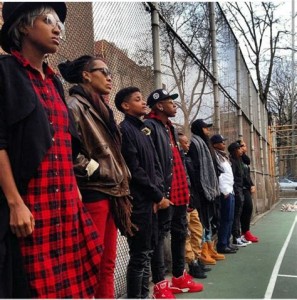The Same Difference: Gender Roles in the Black Lesbian Community
Filmmaker: Nneka Onuorah
Year: 2015
Running Time: 67 mins
Arcamone, Ren. “The Same Difference At Mardi Gras Film Festival.” LOTL: Australia’s Lesbian Magazine, 30 Sept. 2019, https://www.lotl.com/events/film/the-same-difference-at-mardi-gras-film-festival/.
Synopsis:
In The Same Difference: Gender Roles in the Black Lesbian Community, lesbian Nigerian-American filmmaker Nneka Onuorah interviews Black lesbians about their viewpoints on the way gender representation and expression affects interactions between communities of Black lesbians. Onuorah is trying to make visible the rules that operate within Black lesbian spaces, regulating the ways that masculine presenting lesbians, referred to as Studs or AGs are able to express their gender as well as the stigma that is cast upon bisexual women’s experiences. Her interviews reveal the ways that hetero-normative expectations of gender expression in relationships, as well as underlying forms of homophobia and biphobia affect members of the Black lesbian community. She splits the documentary into 4 segments, separated by text flashing on the screen describing the rules that she is exploring. The rules are as follows: 1. Must be a stud or a femme. Nothing in-between; 2. No Stud on Stud; 3. No bisexuals; 4. No pregnant studs. Onuorah center’s each segment on one or two Black lesbians who are explicitly breaking one of these rules. She interviews them about their experiences and beliefs about gender expression, and intercuts those discussions with footage of opposing opinions, Black lesbians seeking to enforce the aforementioned roles expected of each woman. The filmmaker keeps the editing style of the film minimalistic yet maintains an intimacy with the interviewees, especially the four main storylines, by interviewing them in unconventional and often informal settings. She cuts together shots of these interviews without introduction and allows the contrasts between viewpoints to become apparent through the responses of the women interviewed. Onuorah also looks to create a narrative arc within the stories of the four main subjects as they share their experiences and end up in a face to face or over the phone confrontation with members of the Black lesbian community who have expressed discomfort or outrage at their gender presentation. These confrontations put the two opposing viewpoints in conversation attempting to find a common ground and gain recognition of the similarities between the women. This does not always happen between the interviewees, but Onuorah ends the film with shots of the interviewees laughing, dancing and hugging, seeking to emphasize the point that these differences in gender presentation should not stand in the way of community.
The Same Difference won the Audience Award for Outstanding Documentary Feature, NewFest LGBT Film Festival and was screened at the Frameline, San Francisco International LGBTQ Film Festival, Reel Affirmations LGBT Film Festival, the Sacramento International Gay and Lesbian Film Festival, Out Fest Fusion, QFest St Louis, Queer Screen Mardi Gras Film Festival, and Q Films Long Beach.
Bibliography:
The central concern of this documentary is the way that gender expression, sexuality, and race interact within Black lesbian communities. In understanding this work, Judith Butler’s landmark work Gender Trouble and her discussions of performativity within the book would be a good starting place. In addition to that, this documentary brought to mind Audre Lorde’s biomythography Zami: A New Spelling of My Name, a book where the poet and thinker reflects on her experiences as a Black lesbian feminist. She ends the book with a poem about her realization of the impossibility of finding a community that is exactly the same as she is, even if they share identities of race, sexuality, gender, etc. I find that that poem resonates particularly well with the themes of this documentary.
Judith Butler, Gender Trouble – https://tripod.swarthmore.edu/permalink/01TRI_INST/1if4io7/ouporr10.1093%2Foxfordhb%2F9780198717133.013.59
Audre Lorde, Zami: A New Spelling of My Name – https://tripod.swarthmore.edu/permalink/01TRI_INST/j0hcq8/alma991002662879704921

